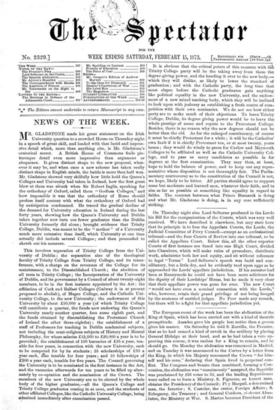It is obvious that the critical points of this measure
with the Trinity College party will be the taking away from them the degree-giving power, and the handing it over to the new body,— which they will dislike, as likely to lower the standard of graduation ; and with the Catholic party, the long time that must elapse before the Catholic graduates gain anything like political equality in the new University, and the endow- ment of a new mixed teaching body, which they will be inclined to look upon with jealousy as establishing a fresh centre of com- petition with their own seminaries. We do not see how either party are to make much of their objections. To leave Trinity College, Dublin, its degree giving power would be to leave the whole prestige of name and repute to the Protestant College. Besides, there is no reason why the new degrees should not be better than the old. As for the enlarged constituency, of course it must be chiefly Protestant for a while ; it will be the Catholics' own fault if it is chiefly Protestant ten, or at most twenty, years hence ; they would do wisely to press for Carlow and Maynooth Colleges to be affiliated as well as the Catholic University Col- lege, and to pass as many candidates as possible in for degrees at the first examination. They may then, at least, hope to hold the balance of power, and to keep out any repre- sentative whose disposition is not thoroughly fair. The Parlia- mentary controversy as to the constitution of the Council is not, we hope, likely to be bitter. All parties should agree to support none but moderate and learned men, whatever their faith, and to aim as far as possible at something like equality in regard to faiths. The contrast between what Prince Bismarck is doing and what Mr. Gladstone is doing, is in any case sufficiently striking.


































